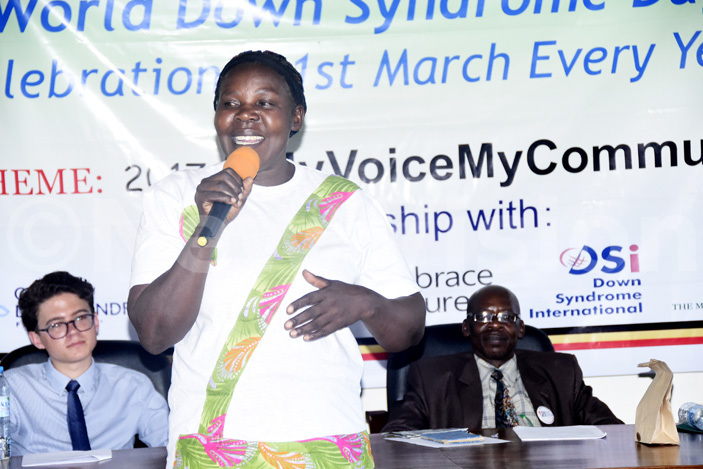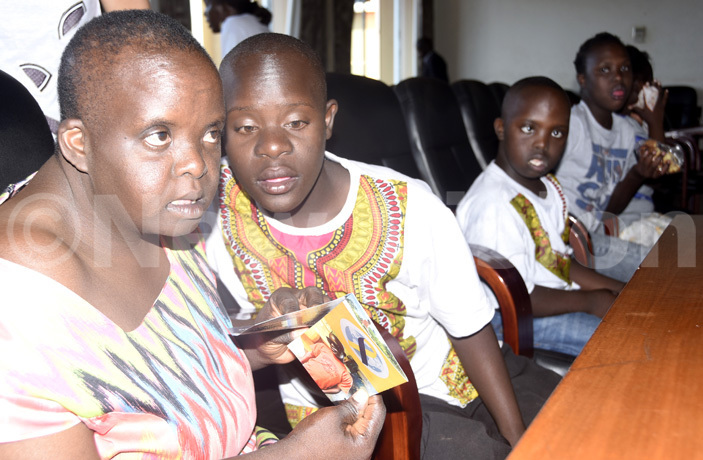Women above 40, at risk of delivering babies with Down syndrome
Mar 22, 2017
"I realized my baby was different and when I got home I told my husband that my child was not like others. He did not react and only told me that we should love the child because that is what God had given us,"

She holds the microphone and quickly an emotional voice pierces through as she addresses fellow parents who had come together with their children to commemorate the World Down Syndrome Day organized by the Uganda Down Syndrome Association at Senate building main hall Makerere University on Tuesday.
Loy Lule 56, a mother of four and a resident of Kirinya Kalo Namataba shares her pregnancy and delivery experience of her last baby Samuel Mugabi now 16.
Lule carried her pregnancy to term and was delivered through C-section. But to her shock, the baby did not look normal.
"I realized my baby was different and when I got home I told my husband that my child was not like others. He did not react and only told me that we should love the child because that is what God had given us," Lule recounts her ordeal.
 Mother of a child with Down syndrome, Aketch Anna Rose narrates her ordeal during the World Down syndrome Day celebrations
Mother of a child with Down syndrome, Aketch Anna Rose narrates her ordeal during the World Down syndrome Day celebrations
Anna Rose Aketch 49, a resident of Mutungo says the journey of nursing her sixth and last child Obo Bonifa 15, has not been rosy. Aketch says apart from having Down Syndrome, Obo was born preterm. Besides, her husband packed bags and left her saying there are no such conditions in his family.
"Obo came out preterm and had funny features: along neck and a flat back. He was incubated for three months and later discharged. Though I had to take him for review every after two weeks, I did not know why and did not realize that my baby had Down syndrome," Aketch laments.
Lule and Aketch are among the many mothers who have had their last babies born with Down syndrome.
 Some of the children with Down syndrome at the World down syndrome Day celebrations
Some of the children with Down syndrome at the World down syndrome Day celebrations
What is Down syndrome?
Dr. Daniel Tumwiine a paediatrician from Children's clinic Nalya describes Down syndrome as a chromosomal disorder caused by an error in cell division that results in an extra 21st chromosome. The condition leads to impairments in both cognitive ability and physical growth that range from mild to moderate developmental disabilities.
Dr Tumwiine lists the common characteristics of children with Down Syndrome as small ears, short fingers and broad hands, flat neck at the back with a low lying hairline, protruding tongue, small mouth cavity, slanting eyes, a below average weight and height at birth.
Though there is no existing data on the number of children with Down syndrome in Uganda, internationally one baby in every 1000 babies is born with the condition. With a Ugandan Population of 36 million, this translates to about 36,000 people with the condition in Uganda.
Who is at risk?
Dr. Jolly Beyeza, a senior gynecologist/obstetrician at Mulago hospital says the chances of a woman delivering a baby with Down syndrome increase with advanced age usually from 40.
"Children with Down syndrome tend to be last borns and it occurs as the mother's age increases because the quality of her ova decreases," Dr. Beyeza explains.
Although women in developed countries have children in late age, screening for Down syndrome is mandatory during antenatal care (ANC) and the mother is advised to terminate the pregnancy if the baby is found to have Down syndrome.
Unfortunately, it is not the case in Uganda yet women now prefer to have their babies after 35 in pursuit of career and money.
Dr. Beyeza advises women to plan and have children early to avoid getting children with such genetic abnormalities.
